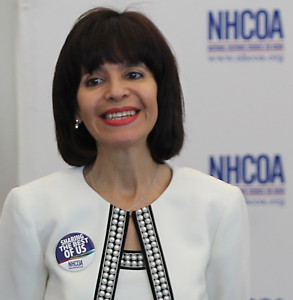August is National Immunization Awareness Month (NIAM), and when it comes to vaccines, it’s important to keep in mind that immunizations are not just for kids – we all need to get vaccinated at different points throughout our lifetimes. That is why it is important for older adults to know what vaccines they may need, where they are administered, and receive encouragement from their trusted health care providers and loved ones to get immunized.
The fact is that the existence of vaccines is the one of the reasons we are able to live longer, healthier lives. Diseases that used to be deadly are now preventable, and NIAM presents an opportunity to highlight the value of immunization across one’s lifespan.
As one of several DEC founding members dedicated to improving the lives of our diverse seniors across the country, the National Hispanic Council on Aging (NHCOA) knows that keeping up with the CDC-recommended vaccination schedule is a key part of staying healthy for all older Americans. Therefore, in commemoration of NIAM, here are five reasons why older Americans should get vaccinated:
1. Vaccines are not just for kids.
Vaccines are an important part of a person’s preventive care at all stages of life, not just childhood.
2. Vaccines are an important step in protecting adults against serious, often deadly diseases.
While it may not seem to make sense, the truth is that vaccinations are necessary throughout childhood and beyond. Every year the CDC issues vaccine recommendations based on the latest research on vaccine safety, effectiveness and patterns of vaccine-preventable diseases.
[Click here to see the 2014 CDC adult vaccination schedule by age group. A Spanish version is available as well.]
3. Vaccines can protect older adults from serious and sometimes deadly diseases.
The CDC recommends older adults get vaccinated to prevent serious diseases such as the flu (influenza), shingles, pneumonia, hepatitis and whooping cough. Many of these diseases are common in the United States and therefore all adults— especially diverse elders—can benefit from immunization.
There are also vaccines that prevent cancer, such as the hepatitis B vaccine. The vaccine prevents chronic hepatitis B, which in turn prevents liver cancer.
The reality is that avoiding vaccinations results in the needless hospitalizations of thousands adults in the U.S., and in the worst of cases, death. However, perhaps the most important function of vaccines is to prevent the spread of certain diseases among those who are most vulnerable to serious complications, which includes diverse seniors.
[Click here to find out which vaccinations are covered by Medicare.]
[The new ACA Health Insurance Marketplace plans cover vaccinations as free preventive services with no copay or coinsurance charges]
4. Most adults have probably not received all the immunizations they need to stay healthy.
The rates of adult immunizations among older adults aren’t as high as they should be, exposing them and their loved ones to preventable diseases. And, although many older adults may consider immunizations to be important, many may be unaware that they need to get vaccinated as well, which is why health care professionals play an important role in informing their patients about the need to get immunized. Seniors should also talk to their health care providers about which vaccines are best for them given their specific health situation.
[Click here to find out your closest vaccination provider]
5. Vaccines are safe.
All vaccines are thoroughly tested before being released to the general public to ensure they are safe for use. While vaccines do have side effects, they are usually minor and temporary. It is possible for some people to have allergic reactions to certain vaccines, but serious and long-term effects are rare.
The week of August 24-30 is dedicated to raising vaccination awareness among adults, including diverse seniors. NHCOA is a proud partner of the CDC in helping inform and raise awareness about getting vaccinated among Hispanic older adults, their families, and caregivers through its signature immunizations program, Vacunémonos (Let’s Get Vaccinated). Vacunémonos is a culturally, linguistically, and age sensitive community intervention that aims at increasing adult vaccination rates among Hispanics. For more information, please visit www.nhcoa.org.
Additional Resources
NHCOA Vacunémonos Pinterest Board [Bilingual]
NHCOA Vacunémonos Immunization Brochure [Spanish]
Posted by Maria Eugenia Hernandez-Lane, Vice President of the National Hispanic Council on Aging (NHCOA). The opinions expressed in this article are those of the author and do not necessarily reflect those of the Diverse Elders Coalition.


